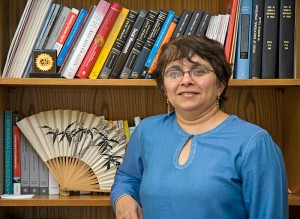
Women are playing a major role in shaping the globalization of trade, politics, and culture in Africa, Asia, and Latin America and are not merely peripheral players in the global movement, according to Manisha Desai, director of women’s studies.
In her new book, Gender and the Politics of Possibilities (Rowman & Littlefield, 2009), she argues that women around the world are social actors who actively constitute globalization, in contrast to many mainstream accounts of globalization that focus on multinational corporations, technological processes, and global institutions.
“I wanted to present a picture of globalization that showed women as agents who were doing more than just engaging in low-wage manufacturing work or care work,” says Desai, an associate professor of sociology in the College of Liberal Arts and Sciences. “I wanted to show that women were not just the victims of globalization, but are actually shaping globalization.”
Desai’s book is based on the premise that men and women participate in different ways in the processes of globalization. She examines three case studies: cross border traders in Africa; transnational feminists working through the United Nations, grassroots collaborations, and the World Social Forum; and modemmujers in Latin America, women who are bringing the benefits of information and communications technologies to rural women.
Desai has gained insights on the globalization of the market place first-hand through her travels.
“If you look in southern or West Africa, most of the people who sell things on the streets and in markets are women,” she says. “Everywhere I would notice this. Particularly in India, I would notice women subcontracting in their homes, doing piecework.” Women sell mostly foodstuff and arts and crafts, she adds.
Cross-Border Traders
Desai says the mainstream literature on globalization – particularly in the business field – has not looked at cross-border trade, which is what many women are involved in.
“More than 70 percent of cross-border traders are women,” she says. “It’s particularly true in Africa, and to some extent in central Europe and Asia, but we don’t look at them because that’s very often considered either illegal or informal or the underground economy.
“Yet it’s mostly that trade that really supports the livelihood of most people” she adds. “If we’re going to really look at globalization, we need to look at the trade that actually supports people’s livelihoods.”
Desai notes that, although cross-border trade has been going on for a long time, contemporary globalization has very specific meaning for women who conduct trade across borders. In southern Africa, for example, traders are now able to go into post-apartheid South Africa.
“There has been an opening up of borders,” she says.
Desai says women in West Africa and Ghana are going to Dubai, to the United States, to the United Kingdom, and other places they did not go before globalization to purchase consumer goods that they then sell back home.
“None of this would have been possible in the past,” she says. “Women 300 years ago were not going to Dubai and to the United States and the UK. Those places didn’t even have the kinds of goods they’re trading today. Nation states also did not allow movement of goods and people.”
Desai notes that women who engage in cross-border trade have the ability to function in many cultures and languages. “The cross-border traders are the new cosmopolitans,” she says.
Focus on Gender
The book is part of Rowman & Littlefield’s Gender Lens Series, which is devoted to social change aimed at eradicating inequalities. The term “gender lens” refers to giving visibility to gender in social phenomena.
“The book in some ways has come out of my earlier work,” Desai says. “I’m a sociologist by training, and most of my work has been on social movements and social change.”
As a child growing up in India, Desai became aware of gender prejudice at an early age. During the 1970s and ’80s, she says, schools of social work, medicine, and engineering were hotbeds of radicalism in India, and Desai became involved in women’s issues. She earned a master’s degree in social work at Bombay University, and later won a fellowship to pursue a doctorate at Washington University in St. Louis, where her dissertation focused on the women’s movement in India.
For the past decade, Desai has studied transnational feminism, gender, and globalization, and how globalization has shaped and affected women’s movements around the world. An earlier book she wrote with UConn sociology professor Nancy Naples looked at women’s activism and globalization.
In addition to academic positions at UConn, the University of Illinois at Urbana Champaign, and Hobart and William Smith Colleges, Desai has worked as a senior programme specialist in the Gender Equity and Development Section of the Human Rights Division at UNESCO in Paris, and served as the Sociologists for Women in Society’s NGO representative to the United Nation’s Economic and Social Council.

